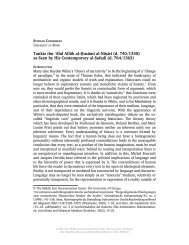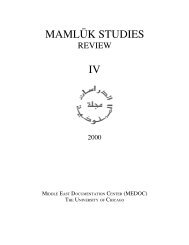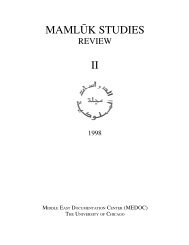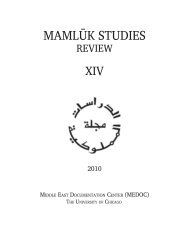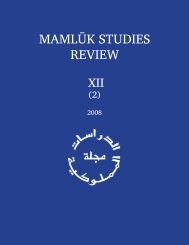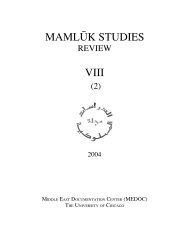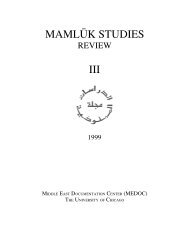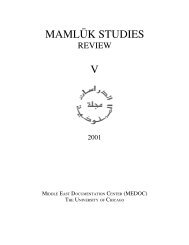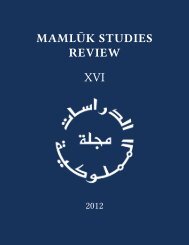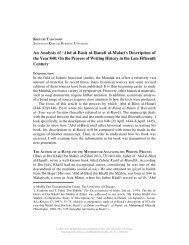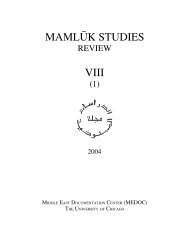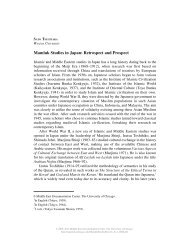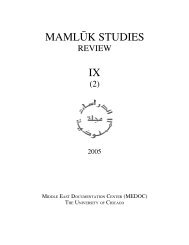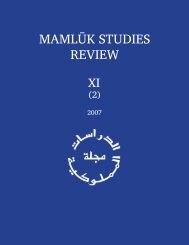Mamluk Studies Review Vol. VI (2002)
Mamluk Studies Review Vol. VI (2002)
Mamluk Studies Review Vol. VI (2002)
Create successful ePaper yourself
Turn your PDF publications into a flip-book with our unique Google optimized e-Paper software.
16 DONALD P. LITTLE, MAMLUK MADRASAHS<br />
Here, then, is an explicit warning that waqf|yahs in general contain only the<br />
intentions of the endower without guarantee that they will be observed. This is<br />
true, al-Nuwayr| states, even during the endower's lifetime, even, moreover, if he<br />
be the sultan:<br />
I was confirmed in the decision [to reproduce the terms of the<br />
endowment] by what happened in this blessed [Na≠s˝ir|yah] madrasah<br />
from the very beginning, despite the endower's remaining alive,<br />
despite ample reason to scrutinize it, despite the appointment of<br />
chief judges, notable ulama and distinguished jurisprudents to teach<br />
there. All this notwithstanding, the stipulation of the endower was<br />
violated in many respects, and the salaries fell short of the endower's<br />
provisions, even though there was a surplus of funds. . . . 30<br />
Before examining the infractions we shall look at al-Nuwayr|'s version of the<br />
history of the madrasah and its endowment deed. As is well known, the original<br />
tomb-college complex had been endowed and partially constructed by the sultan<br />
Kitbugha≠ during his short reign (694–96/1294–96). After his deposition, work<br />
ceased until 698/1298–99, when al-Na≠s˝ir returned to power. With the advice of<br />
chief qadi Zayn al-D|n ibn Makhlu≠f, controller of royal properties, the sultan<br />
bought the building and endowed it with a monthly income of 18,000 dirhams<br />
from rents in Cairo and environs alone. According to al-Nuwayr|, only two days<br />
before al-Na≠s˝ir's departure for Syria in 698 to meet the Ilkhan Gha≠za≠n in battle,<br />
this same Ibn Makhlu≠f had himself, and his descendants, appointed as controllers<br />
of the waqf and as professors of Maliki jurisprudence in the madrasah. But this<br />
audacious action in the judge's favor emboldened one of his assistants in the<br />
Crown Property Bureau, Shams al-D|n ibn ‘Uba≠dah, to advise the sultan to change<br />
the terms of the waqf|yah in such a way that it would not exclude the sultan and<br />
his freed eunuchs from the benefits of the endowment. This the sultan did and<br />
replaced Ibn Makhlu≠f as controller by al-Na≠s˝ir's freed eunuch, al-T˛awa≠sh| al-Am|r<br />
Shuja≠‘ al-D|n ‘Anbar al-La≠la≠ al-Kha≠zinda≠r, and other Qalawunid freed eunuchs<br />
after him. 31 This is not the place to discuss the role of eunuchs in <strong>Mamluk</strong> endowed<br />
institutions; 32 suffice it to say for the time being that ‘Anbar was an extremely<br />
powerful individual in the <strong>Mamluk</strong> state, holding as he did controllership of three<br />
30 Ibid.<br />
31 Ibid., 61–62.<br />
32 See Shaun Marmon, Eunuchs and Sacred Boundaries in Islamic Society (New York, 1995);<br />
David Ayalon, Eunuchs, Caliphs and Sultans: A Study of Power Relationships (Jerusalem, 1999).<br />
© <strong>2002</strong>, 2012 Middle East Documentation Center, The University of Chicago.<br />
http://mamluk.uchicago.edu/<strong>Mamluk</strong><strong>Studies</strong><strong>Review</strong>_<strong>VI</strong>_<strong>2002</strong>.pdf



